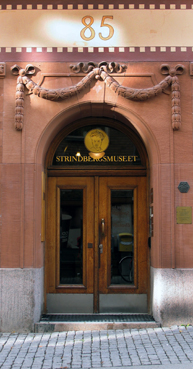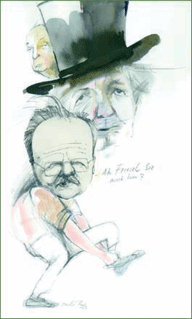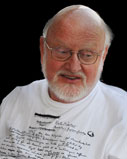 Art Nouveau
Art Nouveau
Got an e-mail to please come and see a certain Mr. A.S. in Drottninggatan 85. A rented flat on the forth floor, but no problem, really, as the house is most modernly equipped with hot and cold running water, WCs and an electrical elevator.
And it is true: in a remarkably beautiful staircase with colored stained windows one finds a refined casing of cast iron and inside a wood paneled lift car lined with slender crystal mirrors. The staircase surrounding it reminds me immediately of the house of the Nabokov family in St. Petersburg: the same stained glass windows and a paneling of comparable stylishness. Although not as palace-like, everything. One size smaller here. Bourgeois, that is.
 The host himself opens the door. He is clad in a mohair morning gown and a buttoned shirt underneath without a collar. His hair is combed in a special way, upward at the sides rather than down. Through a narrow hall, in which some sort of theatre painting is displayed, with a somewhat outdated cooling box standing underneath, he leads me into his rooms, which seem to be cut off from further localities at the right hand side.
The host himself opens the door. He is clad in a mohair morning gown and a buttoned shirt underneath without a collar. His hair is combed in a special way, upward at the sides rather than down. Through a narrow hall, in which some sort of theatre painting is displayed, with a somewhat outdated cooling box standing underneath, he leads me into his rooms, which seem to be cut off from further localities at the right hand side.
As the house, so are the furnishings. The little tables, cupboards, lamps, vases: the purest of Jugendstil. In the lamps incandescent bulbs are screwed which shed a matted red light, not unpleasant, but a little bid dark for my taste, which impression is still enhanced by the hand woven half drawn curtains in front of the very big windows. All in my colors, the host says. Yellow, green, and red. And strongly so, to be sure.
To Tegnérgatan and Drottninggatan, two balconies open, whose artfully welded balustrades I often admired from below when strolling by, just like the rest of the elegant house with its right-angled projecting corner part and the ornaments and Faience tiles and a beautifully shaped ridge turret making the whole structure look like a blue tower.
Do you live here since long? I ask.
Oh, since 1908, he says. Since I can afford it. Since I‘m alone, to be correct. It‘s a newly built house. Look: everything is electric. With pride he points at the wall lamps and the big adjustable pendant lamp above the dining table. The electric wires, plus and minus carefully separated, are fixed to the wall on tiny porcelain isolators.
Why, then, did you invite me? I want to know.
In the middle of the sixties, you have taken part in the new translation of my novel At the Open Sea, which I judge well rendered – and as you know yourself, translations are a matter of luck, he laughs.
Faintly I remember this job during my student years. But how he should have got to know about it is a complete mystery to me since it is nowhere mentioned in the book. I had only typed out for the old lady, seventy-six she was then, what she dictated from the original (as, because of her arthritis, she herself could no longer write on a typewriter). Every now and then I had, upon her request, modernized certain sayings and dialogues. One can detect it in the Suhrkamp edition of this novel, but one cannot prove that it is by me.
Now, isn‘t that Goethe over there? I say in order to gain time, pointing at a somewhat greasy plaster cast. Quite right, he says, and the other is Schiller. And Beethoven you find as well, above the piano. The piano, by the way, stems from Berlin.
And the paintings on the wall?
You mean the oils? They are authentic. Done by me, that is.
You are a painter too?
I have given it up, really, he sighs and suddenly has a deep crease above the root of his nose. Just like making gold. And photographing. One must do psychological photos, you know, just like one has to do psychological pictures. And writings, of course. Ultimately, all we express and by which we are driven comes from inside: a tiny intimate theatre that we carry around with us in our heads.
Given up making gold? Like Wagner in "Faust"?
Right. Like Goethe‘s Faust‘s Wagner. As a man of modern science, one has to fight positivism in due time.
Now we enter his study, advancing towards a surprisingly small, surprisingly orderly writing desk. There are but few books, but Meyers Konversationslexikon – which, as it suddenly comes back to me, was Nabokov‘s favorite as well because of its accurate steel etchings of butterflies – is present there in just about thirty volumes.
He notices my glance and laughs again. Yes, you Germans, he says. Encyclopedia you can make. And beer. And your soldiers are enormously fat and tall. He falls silent for a moment, and then adds: But then, as a city, Berlin is quite exciting.
Everybody tells me that, here. Whereas I think, Stockholm…
Stockholm? Stockholm is a bigoted dump for a bunch of philistines. If it weren‘t for my own intimate theatre lately, my pieces would not be played here. Do you know that they have brought me to court because of the way my characters talk? For causing a public nuisance! – But, just in case you are missing them: I have a few thousand books more, up in my library, two stories above. Do you see the two telephones over there? One goes up to the library, the other out in the world. Two important connections.
I haven‘t seen a kitchen either, I say.
After three marriages, one loathes cans and cups, plates and platters. Above our heads is the Pension of Mrs. Falkner. There I phone, and they bring me something to eat. Or I descent to the pub downstairs.
How very practical, I say (and again feel reminded of Vladimir Nabokov, as he aspires to keep the bellboys in a good mood by offering an exactly measured tip each time he rings for one of them).
But somehow everything seems a little odd: in good shape, but somewhat old-fashioned upon closer look, and I decide to put a certain question to the landlord. But that one has just retreated behind a small door in the hall. In vain I wait for the sound of the famous flushing he mentions in his mail. There is silence. I knock at the door: no response. Or is it the next door, looking alike? I open it and find myself standing in a foyer, facing a reception with a young woman behind it. She is a cute, smiling, Scandinavian blond. Too young, I think, and besides, didn‘t he say he was divorced?
I stare at her. She laughs. Something wrong? she asks in Swedish.
Only now do I realize that the whole time I have conversed in German with my host. But to her I rather speak English, as is the habit in Stockholm. Younger people mostly do not understand German here.
Where is the Landlord gone? I ask. The host? The tenant?
She looks at me from an angle, as if doubting what I just asked. I was invited here via e-mail, I said. By the landlord who as it appears is a writer.
Has he lived here for some time already? she asks with a peculiar smile which I feel uneasy about. Ever since 1908, I‘m on the brink to answer, when I suddenly realize that in that case, he must be more than a hundred years old by now. I prefer to remain silent. Why didn‘t I check this earlier? When he himself mentioned it?
Obviously, I‘m well on my way to making a fool of myself. She looks at me, mustering me from top to toe, and her stare stops short at my shoes.
You have not put any felt sneakers over your shoes?
Felt sneakers?
Yes, those in the laundry basket. Over there, next to the door. In the museum you may run about with your street shoes, but not in his private rooms. Because in there, the original tapestries are lying, and we have not sealed the wooden floor either.
Laundry basket? I never saw any laundry –– I don‘t even know that door! I‘ve never been in this room before!
But you have seen his flat, you say? she asks, suddenly very severe, and gets up. She takes a key out of a drawer and walks past me towards the door that leads to the stair case. She tries to open a door right opposite to the Jugendstil elevator. It is locked. She has to turn the key twice.
She comes back and scrutinizes me. Without a word. After some moments I say: He has disappeared behind a small door, and I thought, it was the toilet. But it seems it was the door right behind me, after all, and you must have noticed him. Unless, of course, he is still in the toilet.
Nonsense! she says shortly. The WC is shut off from the public with plastic glass, so that nobody can use it. So is his working study. To make sure that nobody will sit down to snatch the expensive English pens and the French inkwells.
His working study is shut off with plastic glass? 
But the question fortunately gets stuck in my throat: because in rushes Jan Myrdal heading a flock of Chinese. Ah, Friesel, you here too? he hails with his booming voice, in German. The blond reception lady looks from him to me and back to him. Guess he also wants to experience for once standing on the famous balcony, he prompts her, in Swedish.
You even were on the balcony? she turns to me, irritated, in English.
The Chinese who have stood listening very attentively in a circle around us start to laugh. Slee language sam tim, one of them says.
I shall now guide these friendly study guests from Asia through this occidental fiasco. He never got any Nobel Prize, like both my parents did. Picture that!
Right: both parents of Myrdal received the Nobel Prize, his mother for peace, his father for economics.
But he received the Anti-Nobel Prize by the people, which the simple folks collected for him, says the young woman. Fortunately, her attention is now diverted to Myrdal‘s Chinese.
With that, I could have coped better, as a child, says Myrdal vaguely. And as far as I am concerned, in this life it is hardly going to happen any more, not with print on demand technique. And then, turning towards me, nearly aggressive: A technique propagated by you, isn‘t it?
And by you! I retort. You are its creator – more or less.
More less. Hardly any more, he repeats. Want to join me guiding? It‘s Swedish, though.
Nope, I say. Have been around already. And I cannot get rid of the suspicion that it was Myrdal, in his Mohair overcoat looking ever more like the host himself, who had conducted this private tour. Doesn‘t he know my e-mail address? Of course he does! He knows it since our Black Sea Cruise of Writers. He wants to pull my leg! But when I want to nail him down to it, he‘s already disappeared in the adjourning living quarters, together with his Chinese, who meanwhile had all put on appropriate felt snickers. Or sneakers, rather.
Report from a Chinese village. Pure dream play.
Don’t you want to see at least our Stockholm panorama still, here in the main tract? The cellestographics? The psychological portraits? Berns‘ restaurant, the Red Room? The cloud pictures? The timetable? You may also purchase a t-shirt, with the first page of The Red Room in facsimile print on it. In his own handwriting!
No thank you, rather not, I mutter evasively, how much do I owe you?
Nothing, she says. Since he invited you by a personal e-mail…
I find her haughtiness intolerable. However, unable to prove my point here and now, I retreat with a short Tack! and Hej då! And while waiting at the elevator for the Jugendstil car to arrive, I can still hear her blond laughter from behind the door.
(Stockholm 2005, translation by the author. © Illustration André Prah)
